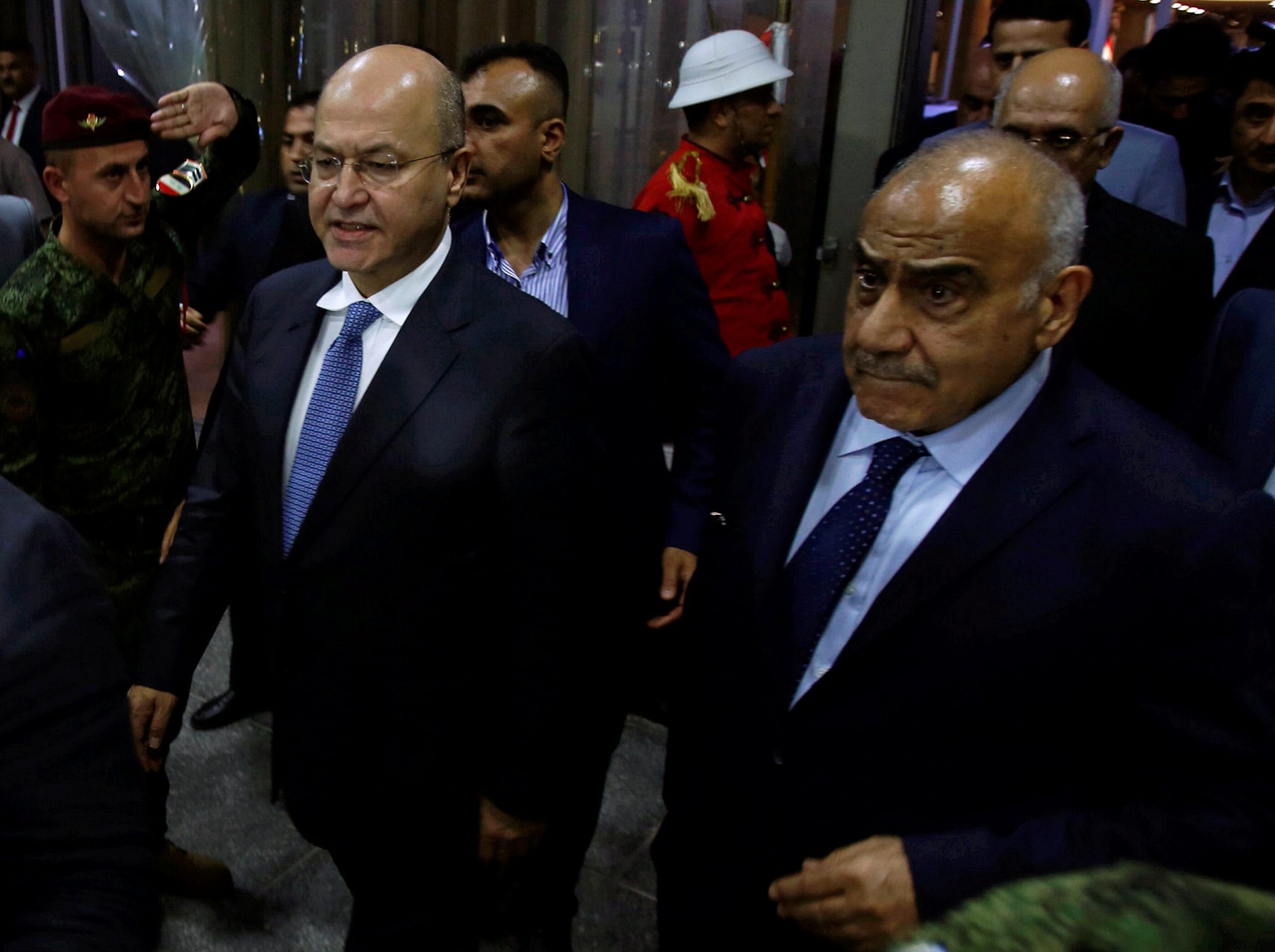Latest topics
Can Iraq’s new leadership win (and keep) the peace?
Dinar Daily :: DINAR/IRAQ -- NEWS -- GURUS and DISCUSSIONS :: IRAQ and DINAR -- ARTICLE BASED INFORMATION and DISCUSSIONS
Page 1 of 1
 Can Iraq’s new leadership win (and keep) the peace?
Can Iraq’s new leadership win (and keep) the peace?

Iraq now has a new government in place, six months after holding elections against a backdrop of a long period of political instability and social unrest.
With the new leadership of Prime Minister Adel Abdel Mahdi and President Barham Salih—both widely touted as reformist, progressive, and Western-leaning—there are high hopes that the country will turn a new chapter after three bloody and arduous years of combatting the so-called Islamic State. Iraq has a multitude of problems, but with this new coalition government, which includes Iraq’s main communities and factions (Mahdi is a Shia politician, Salih a Kurdish one), there could be an important opportunity to seize the momentum and move the country forward.
NOT OUT OF THE WOODS
There are still major challenges to preventing an ISIS comeback and addressing sectarian divisions, the grievances of Arab Sunnis, and weak institutions.
Iraq continues to suffer from dilapidated infrastructure, endemic corruption, vulnerability to outside influence, a bloated public sector, and a rapidly growing population. In other words, reforming Iraq will take years, if not decades.
The new government takes shape amid widespread and vociferous public demands for reform. Iraq’s most recent prime minister, Haidar al-Abadi, failed to win another term amid public discontent and opposition from the powerful Shiite clergy, which stood against him because of his abysmal record in office. With Abadi out, it is the first time in 13 years that Iraq is no longer led by the Islamic Dawa Party, which in many ways failed to satisfy public expectations. It was under then-Prime Minister Nouri al-Maliki’s sectarian watch that Mosul fell to ISIS in June 2014.
Prime Minister Mahdi, a compromise candidate, will have his work cut out for him in the face of a dysfunctional political system and institutional paralysis—problems that may take generations to rectify. He inherits a more than decade-old ethno-sectarian power-sharing structure. Furthermore, both Mahdi and Salih face pressures and constraints from their own respective communities: Mahdi, a longstanding member of the Shiite ruling class has still to complete his cabinet, amid pressure from rival powerful Shiite factions who may torpedo his efforts to govern or advance reforms; Salih, a longstanding senior member of the Patriotic Union of Kurdistan (PUK) and former Kurdistan Regional Government (KRG) prime minister was controversially appointed against the will of the Kurdistan Democratic Party (KDP), Kurdistan’s most powerful party.
A BRIGHT SPOT?
In spite of real challenges, there are areas where the country can capitalize on openings for peace and stability. On Friday, oil exports from Kirkuk were restarted—this, after being halted last October over the standoff between Erbil and Baghdad over the historic Kurdish independence referendum.
If the two capitals—aided by the presence of a new face in Baghdad—can build on this momentum to address other disputes (related to territory, hydrocarbons, and revenue-sharing), there could be positive reverberations around the country. The politics won’t be easy, but economic realities can reinforce the peace-building process.
Resolving tensions would send the right signals to Iraq’s discontented and disenfranchised communities and could reduce polarization—developments that would help prevent an ISIS comeback. That would help kickstart Iraq’s much-needed reconstruction phase.
Last autumn, Kurds and Arabs became embroiled in a conflict in the coveted, disputed territory of Kirkuk. The immediate source of the clash was the Kurdish independence referendum, which took place despite strong opposition from the United States, Baghdad, and Iraq’s neighbors.
(94 percent of Kurdish voters backed secession.) Under then-Prime Minister Abadi’s orders, Baghdad launched an offensive in October—involving the military and Shiite militias—against Peshmerga forces in Kirkuk. The Kurdish nationalist discourse was provocative, no doubt; at the same time, the Iraqi state—as the sovereign—bore the burden to respond responsibly, which it did not. The debacle did not just reinforce Kurdish nationalism and suspicions toward Baghdad, but it also worsened Arab-Kurdish relations.
Years of investments in reconciliation and peace-building can be destroyed in a matter of hours or days.
It should have never been so easy for U.S.-aligned officials (Abadi) to use violence to advance a political agenda against other U.S.-aligned actors (the Kurds).
It’s an important reminder that years of investments in reconciliation and peace-building can be destroyed in a matter of hours or days. A peaceful settlement between Erbil and Baghdad, after three years of sacrifices by the Peshmerga and the Iraqi army, could have been within reach after the referendum.
That could have established a new chapter of peaceful co-existence—a marked departure from past practices of coercion and punishment, especially toward Iraq’s discontented Arab Sunnis, who have endured Baghdad’s suppression for more than a decade.
Ultimately, the post-referendum period became a litmus test for whether Iraq and the United States had learned the most important lesson of all: that keeping the peace is more important than winning the war. That said, there is a new opportunity under the current government and important lessons to heed.
WASHINGTON’S ROLE
The United States can never be a passive actor in Iraq. Sitting on the fence can itself sometimes embolden one side. In the case of the Baghdad-Erbil spat last year, Washington opposed the Kurdish referendum but lacked a policy in its wake, which empowered Baghdad’s mobilization of forces against the Peshmerga.
Moving forward, the United States remains strongly positioned to contain the fallout from disputes in Iraq, mediating tensions and establishing an environment that is conducive to peaceful settlements. Washington should view Iraq’s leadership change as an opportunity to heed past lessons—namely discouraging strongman approaches and making it more difficult for Iraqi actors to resort to force to advance political agendas—and truly turn a new chapter.
For now, Erbil and Baghdad have no choice but to live with one another—out of economic necessity, and because Baghdad cannot close the door on the Kurds without further straining the legitimacy of the Iraqi state after more than a decade of violent resistance from Arab Sunnis. This is an inconvenient but potentially constructive starting point for pursuing a fresh slate. With U.S. encouragement, the two sides can commit to genuine dialogue that seeks to prevent conflict relapse.
IRAQI LEADERS MUST REMAIN VIGILANT
Crucially, Iraq must not repeat past mistakes, growing complacent when a post-conflict situation seems deceptively calm. That complacency enables the next round of conflict: ISIS, for example, emerged in 2014 after a failure to keep the peace following years of bloody sectarian violence between Arab Sunnis and Shiites. In other words, winning the peace only matters if it can be kept.
Aside from its governance challenges, Iraq remains highly susceptible to conflict relapse. Since 2003, Iraq has suffered countless sectarian conflicts and one recognized genocide. Of the 105 countries that suffered a civil war between 1945 and 2013, more than half (59 countries) experienced a relapse into violent conflict after peace had been established—in some cases more than once.
Does Iraq have the leadership to insulate the country from further violent conflict? The record is not great. Iraq’s politicians, across the religious and ethnic spectrum, say all the right things—but have ultimately failed to keep the peace. President Salih and Prime Minister Mahdi have an opportunity to avoid that fate and to set the bar for future Iraqi leaders.
https://www.brookings.edu/blog/order-from-chaos/2018/11/23/can-iraqs-new-leadership-win-and-keep-the-peace/

GirlBye- VIP NewsHound

- Posts : 1484
Join date : 2018-07-09
Location : So Cal
Dinar Daily :: DINAR/IRAQ -- NEWS -- GURUS and DISCUSSIONS :: IRAQ and DINAR -- ARTICLE BASED INFORMATION and DISCUSSIONS
Page 1 of 1
Permissions in this forum:
You cannot reply to topics in this forum

» Dave Schmidt - Zim Notes for Purchase (NOT PHYSICAL NOTES)
» Russia aren't taking any prisoners
» Deadly stampede could affect Iraq’s World Cup hopes 1/19/23
» ZIGPLACE
» CBD Vape Cartridges
» Classic Tony is back
» THE MUSINGS OF A MADMAN
» Minister of Transport: We do not have authority over any airport in Iraq
» Did Okie Die?
» Hello all, I’m new
» The Renfrows: Prophets for Profits, Happy Anniversary!
» What Happens when Cancer is treated with Cannabis? VIDEO
» An Awesome talk between Tucker and Russell Brand
» Trafficking in children
» The second American Revolution has begun, God Bless Texas
» The Global Currency Reset Evolution Event Will Begin With Gold, Zimbabwe ZWR Old Bank Notes
» Tucker talking Canada
» Almost to the end The goodguys are winning
» Dinar Daily Facebook Page